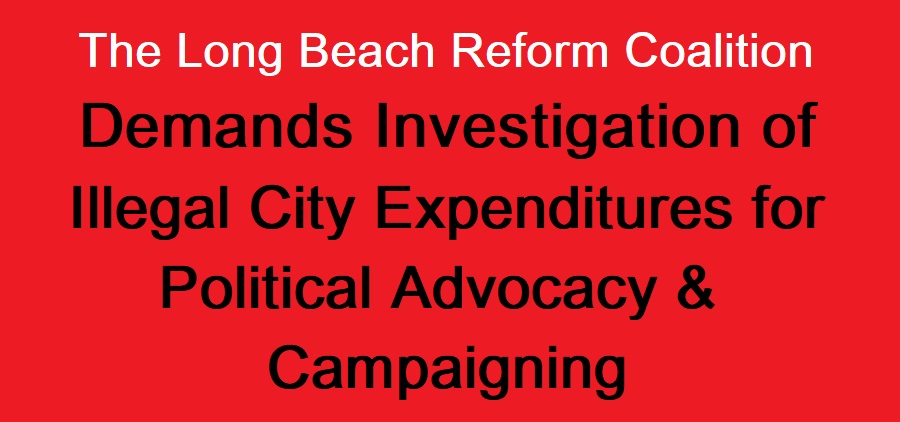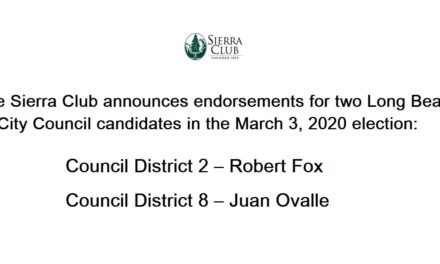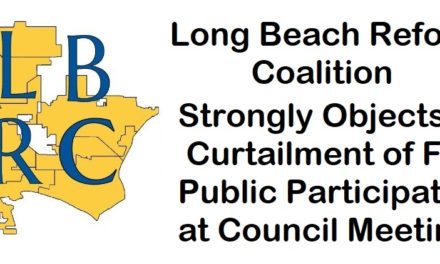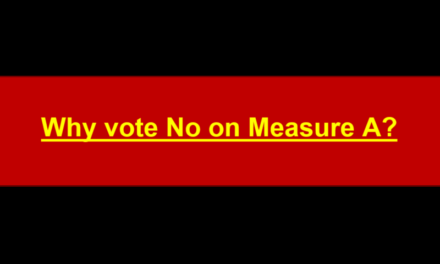Long Beach Reform Coalition (P.A.C. ID# 1409361)
LBReformCoalition.rg
Contact: Ian Patton (cell) 562-810-9329
consultant@calheightsconsult.com
Press Release
LBRC Demands Investigation of Illegal City Expenditures for Political Advocacy & Campaigning
Long Beach, Cal., May 1, 2019:
Within the last year or so the City of Long Beach has increasingly pushed the bounds of legal expenditure of taxpayers’ dollars on electoral-related activities far beyond the breaking point. Now, the combination of, on the one hand, City documents recently obtained by the Long Beach Reform Coalition (LBRC) under the California Public Records Act, and, on the other hand, an audio recording of the most recent meeting of the Long Beach Water Board, also recently obtained by the LBRC, serves to prove beyond any reasonable doubt that the City of Long Beach has been taking residents’ taxpayer funds and using them for political ends. This represents an historically grave violation of the public trust.
The current mounting trend of these corrupt practices began on March 16, 2018 with an action taken by City Manager Pat West in the lead up to the June 5, 2018 statewide primary election, which included local Long Beach Measure M. M was a proposal to enshrine in the City Charter ongoing transfers of “excess” Water Department revenue to City Hall’s General Fund, rather than lowering water rates to Long Beach water customers (as required under state law, and currently the subject of renewed litigation). The previous mechanism for these transfers had been challenged in court by a ratepayer and the City tacitly admitted their illegality by settling that lawsuit, agreeing to return millions of dollars previously collected, and eventually putting Measure M on the ballot in an attempt to devise a more legally sustainable, or so the City hoped, mechanism for future transfers.
After the embarrassment of the water suit settlement, and under the pressure of the potential matter of a major budget hole due to the loss of the previously ill-gotten revenue, Mayor Garcia led the City Council to place Measure M on the ballot and personally took charge of the “Yes on Measure M” campaign to see that it passed. On March 12, 2018 he converted his registered ‘officeholder-controlled’ committee (FPPC ID# 1384353), which he had previously used to campaign in favor of Measures A & B in 2016, into a campaign vehicle to promote Measure M in 2018. That much was legitimate.
But just four days later, City Manager Pat West initiated, as a clear supplement to the mayor’s regular campaign, an illegal parallel City-funded campaign in favor of Measure M, by means of a misallocation of nearly $100,000 in taxpayer money. He abused his power to unilaterally make expenditures below that threshold by means of an official Exception to Policy Request order (attached), filed with the Long Beach Department of Financial Management’s Purchasing Division. The exception form required an explanation Page 2 LBRC Demands Investigation of Illegal City Expenditures for Political Advocacy of why “the purchase cannot be procured using the City of Long Beach’s competitive bid process”. The City Manager failed to provide that mandatory explanation and justified the expenditure simply as “an urgent need” prior to the election.
The funds were then used to hire one of Southern California’s best known heavyweight campaign consultants, Eric Hacopian (EDH Associates), who—as Hacopian stated in his hiring letter to West (obtained through the Public Records Act, attached)—crafted a mailer campaign for the City composed of three separate mail pieces, to be sent not to all or as many Long Beach residents or voters as possible, but rather to the same targeted subset of Long Beach voters. These “63,741 households (of known voters)”, obviously targeted (likely with the benefit of polling data discussed below) because of their voting propensity and assessed persuadability on Measure M, received the full brunt of this campaign—all three mail pieces, one after the other.
Hacopian’s letter used the appropriate language to provide cover for the illegal use of public money on a campaign expenditure—that the goal was to “inform residents regarding the Long Beach Transfer Tax Measure” (which, incidentally, Mayor Garcia claimed was not a “tax”) and that the material would be “prepared by city staff and approved by the City Attorney”. But the letter itself also contradicts itself, revealing its own disingenuousness: Within the same sentence that it states, “To reach as broad an audience possible within the available budget…”, it goes on to outline sending the three mailers to only the same subset of targeted voters, rather than sending one mailer to as many voters as possible (Long Beach has approximately 255,000 voters living at approximately 143,000 household addresses, more than double the number targeted for the three mailers).
With the passage of Measure M, and the failure of enforcement authorities to hold the City accountable, Garcia and West could not help themselves as the November election rolled into view. They renewed the illegal taxpayer-funded mailer campaign scheme, almost exactly as before, but this time in pursuit of a greater prize: The elimination of Long Beach’s longstanding term limit rules (Measure BBB), which would have forced the mayor to meet the high bar of a successful write-in campaign in order to win future terms in office, along with assorted other alterations to the City Charter. We have attached an additional Hacopian hiring letter showing that again the scheme involved an expenditure just under $100,000 to avoid Council scrutiny and this time two mailers were sent, both to the exact same targeted set of 90,391 households, rather than as many voters or residents as possible.
While the information in these two letters alone warrants an investigation into the corrupt use of taxpayer dollars for political advocacy and electoral manipulation at Long Beach City Hall, LBRC has also recently obtained further damning evidence of our City’s pattern of corrupt abuse of public funds from an unexpected location, the Long Beach Board of Water Commissioners (“Water Board”). The most recent meeting of the Water Board, on April 18, 2019 included an unusual agenda item (Item #9), a staff request for approval of up to $50,000 to poll the public on a potential merger of the City’s two main utilities1, the Water Department (overseen by the Water Board) and the Gas & Oil Department (the city’s gas provider):

Well known Southern California pollster John Fairbank, of the polling firm FM3, was in attendance to pitch his wares, and clearly revealed far more about his long-running activities on behalf of Long Beach City Hall than the board expected to have aired in a public hearing, including how to defeat one’s “opponents” and “prevent them from lining up to oppose you” (as if a public utility should have ‘opponents’). Indeed, Commissioner Harry Saltzgaver at one point jumped in to say that the discussion had “made history” by discussing political strategy in public and that he felt the discussion needed to end. Former Long Beach city attorney Commissioner Robert Shannon called the polling proposal potential “disguised advocacy” and potentially “illegal” and “dangerous”. Ultimately, Shannon convinced his colleagues to postpone a vote on the item pending review by the current City Attorney.
Yet the damage had already been done, as Fairbank, in his eagerness to promote his rehiring by the City of Long Beach, had already revealed that his firm had been responsible for the placement on the ballot and passage of all recent ballot measures in Long Beach and that he had “the pleasure of raising all of our taxes”. When questioned by Shannon, he said he could not remember if public funds had been used to pay for his previous polls yet made it clear that that was indeed a common, ongoing practice in Long Beach.
And he made it clear that he was offering to help craft a ballot measure for the Water Board which would ensure passage of the merger of the water and gas utilities by means of public opinion research. In other words, his results could be used to substitute political messaging in the place of a neutral ballot description of the proposal. As Fairbanks put it, “those seventy-five words are exceedingly important.” The 75-word description referred to is called the ‘title and summary’ and is supposed to be prepared by the City Attorney’s office based purely on the facts of the proposed ordinance or charter amendment, not poll testing.
To recap, the interrelated evidence of misuse of public funds for political advocacy recently uncovered by LBRC is as follows:
(1) Political consultant Hacopian crafted City-funded mailer campaigns last year to target only a select group of voters to ensure passage of mayor-backed ballot measures.
(2) Pollster Fairbank’s firm apparently has been routinely hired by and/or for Long Beach city government to ensure passage of these same ballot measures—which involved potential misuse
of tax dollars:
(a) in FM3’s potential hiring at public expense;
(b) in the use of his polling results to breach the public trust in the writing of ballot measure ‘title and summary’ descriptions; and
(c) in the development of the political messaging that went into the illegal City-funded mailers.
Listening to the Water Board meeting testimony by Fairbank, it immediately becomes clear that his polling is not just conducted out of academic interest, it is sold as a tool to deliver results. We know that the polling on the water and gas merger he was there to sell was a clear example of this: He had already briefly polled on the concept of the merger for the charter amendments last year, the concept proved unpopular, and thus the merger, which had been set for inclusion on the ballot with the other proposed amendments, was pulled. Fairbank’s focus now, if hired by the Water Board, would be to do in depth polling just on the merger in order to, as he repeatedly said during his testimony, figure out how to “move” voters. The job of a public utility with rate-setting authority ought properly to be respecting the will of voters (on behalf of ratepayers), not to “move” them politically.
Given these revelation, LBRC is calling on the following authorities with enforcement jurisdiction over public corruption in local government to investigate the City of Long Beach’s practices:
- The Federal Bureau of Investigation (Public Corruption Program)
- The California Dept. of Justice (Office of Attorney General Javier Becerra)
- The California State Auditor (Local Government High Risk Program)
- The California Fair Political Practices Commission (FPPC)
- Long Beach City Prosecutor Doug Haubert (who we call on to investigate, or if necessary
recuse and refer the investigation to the Los Angeles County District Attorney’s Office).
The trend of local governments misusing tax dollars for political purposes is a growing problem in California and unfortunately Long Beach is leading the way. As a result of these abuses, the FPPC has sought enhanced enforcement powers over local governments from the State Legislature. As legendary California political columnist Dan Walters put it, “State law very clearly and specifically makes misuse of taxpayer funds for political purposes illegal, but the FPPC has no power to enforce the law. That’s up to local prosecutors and the state Department of Justice” (‘A crackdown on misusing public funds for campaigns?’, CalMatters, March 3, 2019).
Click below for LBRC’s new in depth explainer video on the issue discussed in this press release. It includes extended annotated audio from the recent meeting of the Water Board, which among other things contains the following astounding revelations about the proposed merger of Long Beach’s two longstanding gas and water utility operations:
- that there was so little Water Board involvement of this proposed massive consolidation that some Water Board members were not even aware that the Board had agreed to “endorse”
the proposed merger, which nearly went on the ballot last year along with the other charter amendments but was pulled due to poor polling, and they had no memory of even discussing
it as a body. - while Water Dept. General Manager Chris Garner has discussed the merger with “downtown” (City Hall, i.e. the City Manager’s and Mayor’s offices) he has admitted to quite literally not having a single conversation about it with the head of the Gas & Oil Department, which runs the city’s gas utility, Director Robert Dowell.
1 As LBRC’s explainer video (which can be viewed here) discusses in depth, the proposed merger of the City’s water and gas utilities is likely motivated by City Hall’s desire to continue skimming ‘excess’ revenue from Long Beach’s water ratepayers, an illegal violation of Prop. 218, rather than returning that surplus in the form of lower water rates. Last year the practice was successfully challenged in court by ratepayers, resulting in a settlement ending the practice as previously implemented (as a charge to ratepayers for the use of pipes under the ground owned by the City). Measure M temporarily restored the revenue stream from the Water Dept. to the General Fund but is still in violation of Prop. 218 and is currently under litigation. The ultimate solution, in City Hall’s eyes, is apparently to funnel the ‘excess’ funds through the Prop. 218-exempt gas utility, by merging the two utilities, thereby laundering the revenue free of regulation under Prop. 218 (which sought to prevent cities from using public utility rate hikes as backdoor tax increases without first getting two-thirds voter approval).
ed. note: The text of this press release was copied from a PDF received from LBRC and the full PDF of the Press Release can be viewed or downloaded AT THIS LINK









